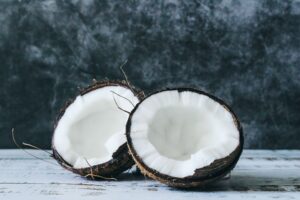Which Coconut Oil Is Best for You?

In the realm of natural beauty, coconut oil has achieved cult status. From its hydrating properties to its versatile uses, it’s become a staple in many skincare routines. However, the world of coconut oil is divided into two main categories: refined and unrefined (often labeled as “virgin” or “extra-virgin”). Understanding the differences between these two types of coconut oil is crucial for making the right choice in your skincare regimen. In this beauty blog, we’ll demystify the refined vs. unrefined coconut oil debate and help you discover which is the best fit for your specific beauty needs.
The Coconut Oil Craze
Coconut oil has enjoyed a surge in popularity as a natural beauty product, and for good reason. It’s rich in fatty acids, antioxidants, and possesses several potential benefits for the skin:
- Hydration: Coconut oil is a superb moisturizer, helping to lock in skin’s natural moisture and prevent dehydration.
- Antibacterial Properties: It contains lauric acid, which has antibacterial and anti-inflammatory effects, making it a potential solution for acne-prone skin.
- Skin Barrier Support: Coconut oil can strengthen the skin’s natural barrier, providing protection against environmental stressors.
- Antioxidants: Its natural antioxidants can help combat the signs of aging and reduce free radical damage.
- Makeup Remover: It’s a gentle yet effective makeup remover and can easily remove even waterproof makeup.
Refined Coconut Oil
Refined coconut oil, sometimes labeled as “RBD” (Refined, Bleached, and Deodorized) coconut oil, undergoes a process that involves bleaching and deodorizing. Here are some key characteristics:
- Neutral Aroma and Flavor: Refined coconut oil is typically neutral in scent and taste, which makes it ideal for cooking.
- Higher Smoke Point: It has a higher smoke point, making it suitable for high-heat cooking and frying.
- Pure White Color: Refined coconut oil is often pure white in color and lacks the tropical aroma of coconuts.
- Longer Shelf Life: Due to the refinement process, it has a longer shelf life compared to unrefined coconut oil.
Unrefined (Virgin) Coconut Oil
Unrefined or virgin coconut oil is minimally processed and retains more of its natural properties. Here’s what sets it apart:
- Distinct Coconut Aroma and Flavor: Unrefined coconut oil has a strong, distinct coconut aroma and flavor, which is excellent for culinary uses and beauty applications.
- Lower Smoke Point: It has a lower smoke point, so it’s better suited for low to medium-heat cooking or as a finishing touch to dishes.
- Pale Ivory Color: Unrefined coconut oil has a pale ivory or off-white color, and its texture can vary from creamy to solid, depending on the temperature.
- Retained Nutrients: It retains more of its natural nutrients, including vitamins, minerals, and antioxidants.
Which Coconut Oil Is Best for Your Skin?
The choice between refined and unrefined coconut oil for skincare largely depends on your specific needs and preferences. Here are some guidelines to help you decide:
Refined Coconut Oil:
- Best for Cooking: If your primary use is culinary, refined coconut oil is a great choice due to its neutral flavor and high smoke point.
- Sensitive Skin: If you have sensitive skin that may react to the strong aroma of unrefined coconut oil, opt for the refined version.
- Less Messy: Refined coconut oil is often less messy due to its neutral color and scent, making it a convenient choice for skincare.
Unrefined Coconut Oil:
- Natural Nutrients: If you’re looking for a skincare product that retains more of its natural nutrients and aroma, unrefined coconut oil is the way to go.
- Beauty Treatments: For beauty treatments like hair masks, body scrubs, or facial moisturizers, unrefined coconut oil can provide a more luxurious experience.
- Gentle Makeup Remover: Unrefined coconut oil is often favored as a gentle and effective makeup remover, suitable for both the face and eyes.
- Tropical Aroma: If you enjoy the tropical aroma and flavor of coconuts, you’ll appreciate the scent and taste of unrefined coconut oil.
How to Use Coconut Oil in Your Skincare Routine
Coconut oil offers a range of potential benefits for your skin. Here’s how you can incorporate it into your skincare routine:
1. Moisturizer:
Apply a small amount of coconut oil to your face, body, or hair as a natural moisturizer. It’s excellent for dry skin and can be used daily.
2. Makeup Remover:
Use coconut oil to gently remove makeup by applying it to a cotton pad and wiping away cosmetics, including waterproof products.
3. Hair Mask:
Apply warm coconut oil to your hair and scalp, leave it in for at least 30 minutes, and then shampoo as usual. This can help with hair hydration and shine.
4. Lip Balm:
Apply a tiny amount of coconut oil to your lips for a natural lip balm that can keep them soft and moisturized.
5. Body Scrub:
Mix coconut oil with sugar or salt to create a natural body scrub that exfoliates and moisturizes your skin.
6. Cuticle Oil:
Massage a small amount of coconut oil into your cuticles to soften and moisturize them.
7. Shaving Oil:
Use coconut oil as a natural shaving oil to moisturize your skin while shaving, reducing the risk of irritation.

Refined and unrefined coconut oil both have their unique qualities and benefits, making them versatile additions to your beauty routine. The choice between them depends on your intended use, personal preferences, and skin type. Whether you opt for the neutral and convenient refined coconut oil or the nutrient-rich, aromatic unrefined version, coconut oil can be a natural, budget-friendly, and effective addition to your skincare regimen. So, bottle the beauty of coconuts and discover how they can enhance your daily routine and skincare.

